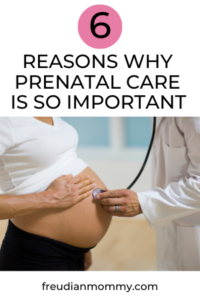6 Reasons Why Prenatal Care Throughout Pregnancy Can Save Your life and Pregnancy
Prenatal or antenatal care is a form of preventive care that is essential for a healthy pregnancy. It can save your life and your pregnancy. The Guttmacher Institute estimates that women in the United States who do not receive prenatal care have an increased risk of experiencing neonatal death. The infants of women who do not participate in prenatal care are 40 percent more likely to die within their first 27 days of life.

For this reason, medical experts recommend that every mama-to-be schedule a prenatal appointment as soon as she finds out she is pregnant.
What is prenatal care?
Prenatal care is the routine supervision and guidance you receive from an OBGYN or midwife throughout your pregnancy. This type of care evaluates the health status of the mother and baby and identifies potential health issues in the early stages of pregnancy. Prenatal care also allows for treatment right away to prevent further complications and promote a healthy outcome for your pregnancy. In the same way, antenatal care enables ongoing risk assessment throughout your pregnancy.
Why is seeking care early in pregnancy important?
Every woman desires a healthy pregnancy. However, you must seek preventative care early and throughout your pregnancy for that to happen. Prenatal care is critical throughout pregnancy because it helps reduce the risk of complications during pregnancy. It decreases the frequency of miscarriages, birth defects, low birth weight, and maternal and neonatal death. It also prevents complications during delivery.
Also read: When to Start Taking Prenatal Vitamins
6 Vital Benefits of prenatal care
1) Detecting multiple pregnancies:
If you are carrying multiples, you and your babies are at an increased risk for health complications such as anemia or preterm labor. You need to know this significant detail upfront because your pregnancy may require additional attention.
2) Education about pregnancy:

Your medical specialist can provide you with the information and knowledge to understand the current and possible changes in your body that could put you and your baby at risk. During pregnancy, biological and physiological changes occur in your body, some normal and some abnormal. Checking in with a specialist such as an OBYN or a Midwife regularly throughout your pregnancy ensures that you understand the difference between what’s normal and what’s not.
Your provider also teaches you about pregnancy-related complications and how to treat them.
3) Identify factors whether your is normal or high risk:
After a comprehensive personal and family history and clinical examination during your first prenatal visit, you are classified as a normal or high-risk pregnancy.
A high-risk pregnancy puts you at a greater risk for complications and requires you to see your doctor more frequently.
The following issues may increase your risk of complications during pregnancy:
- Health conditions such as high blood pressure, diabetes, cancer, and autoimmune diseases prior to pregnancy
- Being overweight or underweight
- Have had complications in previous pregnancies
- You are very young or older than 35 years of age
4) Encourage a healthy lifestyle throughout pregnancy:
A healthy pregnancy is the best way to ensure your child develops healthily. And sometimes, whether you know it or not, you may engage in activities such as smoking and taking certain medications that may be harmful to your developing baby.
Your medical provider is here to encourage you and provide you with the facts about how engaging in certain activities can negatively affect your baby developmentally.
They also encourage you to participate in more activities that will benefit you and your baby.
5) Connects you to other essential providers:
Pregnancy is a special time in a woman’s and a couple’s life. This new experience can bring about a lot of different emotions. If that’s the case, you may need to speak to a therapist to address your fears and concerns about your pregnancy. Finding a therapist isn’t as easy as it may sound. Your OBGYN or midwife can refer you to a counselor who is available and accepts new patients.
And if, after your examination, your doctor discovers you are either overweight or underweight, you may need to consult with a nutritionist who they can refer you to as well.
6) Help guide you through labor, delivery, and parenting:
Your concerns about pain during labor, birth, and delivery are sure to come to life towards the end of the third trimester. And whether you are a first-time mom or a seasoned mom, you’re going to need all the resources and support you can get. The chances are that your medical providers have years of experience and can point you in the right direction for resources and support that will make your journey through labor and delivery and parenting much more successful.
Some prenatal care is better than no prenatal care
There are many benefits to seeking prenatal care right when you find out you are expecting. And a lack of prenatal care can have severe negative consequences for you and your baby.
Even if you can’t afford to participate in the 12-15 routine visits throughout your pregnancy, some form of prenatal cause is better than no prenatal care.
















Thanks for sharing this! Absolutely agree with you, and I wish that every single soon to be Momma out there will have the opportunity to have a proper prenatal care.
It’s great that you talked about getting help with labor, birth, and parenting. My sister announced she’s having a baby on her own because her fiance abandoned her last night. My family is a wreck but is happy about the baby’s arrival, and everyone wants to help my sister. I’ll suggest we start by making an appointment with a prenatal care specialist for my sister next week.